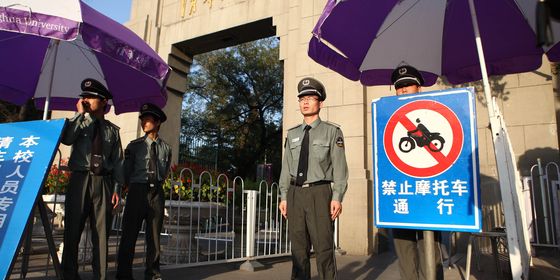New rules allow foreign students with a Master’s degree to apply for a Chinese work permit after graduation
One of the lasting stumbling blocks to China’s push for internationalization in its workforce and higher education has been removed, as the Ministry of Human Resources and Social Security has issued a notice (in Chinese) allowing “excellent” foreign graduates to seek jobs in the country, a move that experts are lauding as a step forward for the globalization of China’s “talent.”
Under the new policy, students who receive a Master’s degree or above at a Chinese or foreign university may apply for a Chinese work permit within one year of graduation, provided that they are over the age of 18, have no criminal record, graduated with grade point average of 80 or above, and have an offer of a job in China related to their field of study.
Wang Huiyao, president of think tank Center for China and Globalization, told China News Service that the policy was a “decisive” step in “removing the barrier for international students working in China,” adding that their inability to work was “drain on talent” for China.
“With policies such as the One Belt One Road, China is engaging in international exchange more than ever, and is in need of international talent,” Wang said.
Prior to this new policy, the basic requirements for foreigners applying for a Chinese work permit were a minimum age of 24 and at least two years’ post-graduation working experience in a relevant field outside of China.
As early as 2014, the CCG and China Academy of Social Sciences’s “Annual Report on the Development of Chinese Student Studying Abroad” noted that the old policy “hindered” the strides that the Ministry of Education was making to lure increasing numbers of international students to Chinese universities. This included generous scholarship packages and increasing numbers of exchange agreements and international programs offered by Chinese universities, which have caused the number of international students in China to triple in the previous 10 years and made China the world’s third most popular destination for study abroad, according to the Comparative and International Education Society (US).
However, the total number of international students has since plateaued. Though named as “equal priories” by president Xi Jinping at a national conference of the MoE in 2014, the number of international students studying in China (around 400,000 according to the MoE’s latest data, from 2015) and that of students leaving China to study abroad (520,000 in the same year) remained unbalanced.
“Because there was no clear path and no space for development provided toward internship, work, and residence, the expectation for students coming to China to study are lowered,” education expert Miao Lü told China News Service, adding that the new policy does not only benefit the Chinese workforce but will likely also attract greater numbers of international students to the country.
Previous attempts to provide work permits to international students had been limited to pilot free-trade or innovation hubs such as Beijing’s Zhongguancun Science Park or Shanghai’s Pilot Free Trade Zone and Zhangjiang National Innovation Demonstration Zone.











